Aftermath Blu-ray Movie
HomeAftermath Blu-ray Movie 
RemnantsRLJ Entertainment | 2014 | 92 min | Not rated | Aug 26, 2014
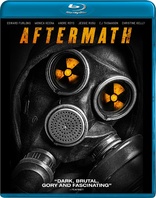
Movie rating
6 | / 10 |
Blu-ray rating
| Users | 5.0 | |
| Reviewer | 3.0 | |
| Overall | 3.0 |
Overview
Aftermath (2014)
Hunter, a young doctor, survives a nuclear attack and is thrown together by happenstance with a group of wounded and frightened victims. In a makeshift shelter in rural Texas, Hunter and his companions wait for news from the government while fending off hunger, radiation sickness, and a horde of frightened and dying refugees.
Starring: Edward Furlong, Monica Keena, William Baldwin, Andre Royo, C.J. ThomasonDirector: Péter Engert
| Thriller | Uncertain |
| Mystery | Uncertain |
| Foreign | Uncertain |
| Drama | Uncertain |
Specifications
Video
Video codec: MPEG-4 AVC
Video resolution: 1080p
Aspect ratio: 1.78:1
Original aspect ratio: 1.85:1
Audio
English: DTS-HD Master Audio 5.1 (48kHz, 24-bit)
Subtitles
English SDH
Discs
25GB Blu-ray Disc
Single disc (1 BD)
Playback
Region A (B, C untested)
Review
Rating summary
| Movie | 3.0 | |
| Video | 4.5 | |
| Audio | 4.0 | |
| Extras | 0.0 | |
| Overall | 3.0 |
Aftermath Blu-ray Movie Review
Another Kind of Walking Dead
Reviewed by Michael Reuben August 17, 2014In 1983, the ABC network aired The Day After, an ambitious telefilm that attempted to portray the aftermath of global thermonuclear war and the grim prospects for those unfortunate enough to survive. Directed by Nicholas Meyer (Star Trek II: The Wrath of Khan) and featuring a cast led by two-time Oscar winner Jason Robards, the film was watched by millions and introduced the term "nuclear winter" into the common vocabulary. Its unrelentingly dark portrayal of life among the irradiated ruins was intended as a cautionary tale. In the thirty-one years since, the threat of nuclear holocaust has been a recurrent theme in movies and TV, but rarely has anyone attempted to recreate the effects of such devastation with anything approaching realism. If nuclear bombs explode on screen, the impact is typically localized, whether underground (Broken Arrow), far off in the desert (24), on a distant island (True Lies) or elsewhere in the country (Jericho). Even when the havoc is widespread, the survivors somehow manage to locate habitable quarters and protect themselves from radiation sickness (Terminator Salvation). Aftermath is a contemporary revisiting of the scenario portrayed in The Day After, but from an even bleaker perspective. In 1983, it was still possible to believe in the essential decency of individuals, even if governments and organizations could not be trusted to behave rationally. Aftermath focuses on a small group of survivors who demonstrate, by their own interactions among themselves and with others, why humanity's annihilation is inevitable once weapons of such destructive power become widely available.
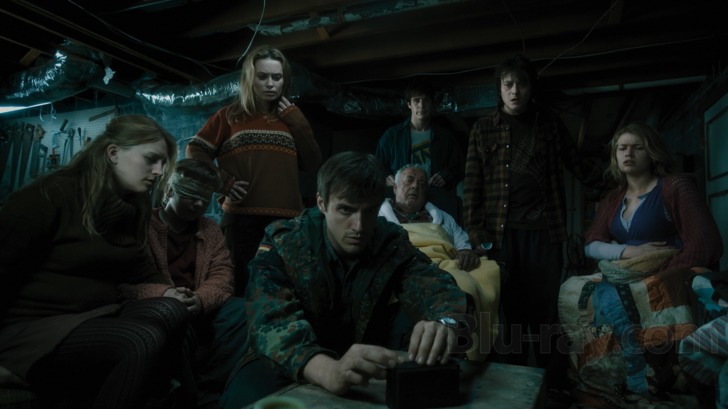
Aftermath opens not on the day after, but a month following nuclear devastation. In a dusty landscape strewn with wreckage and corpses, an ailing, apparently elderly figure arises from a bed and staggers outside. Obviously a survivor, he has no apparent destination. The film then rewinds to just before the catastrophe. On a little traveled road in northern Texas, a backpacker named Hunter (C.J. Thomason, The Monkey's Paw) is listening to the radio. Fragments of news broadcasts report crises in familiar hot spots, including Pakistan and the Middle East. As a young woman and her brother, Jennifer (Jessie Rusu, Mother's Day) and Satchel (Kennon Kepper, Jonah Hex), approach in their vehicle, a mushroom cloud appears on the horizon and the blast sweeps across the highway. Satchel makes the mistake of looking at the explosion and is blinded. Once the initial shock waves have passed, Hunter rushes the pair into the woods searching for a diesel vehicle that isn't disabled and, when they find one, they drive along back roads seeking shelter. Along the way, they pick up Elizabeth (Monica Keena, Freddy vs. Jason), whose car has stalled from the EMP of atomic detonations. Grabbing what supplies they can, these four eventually take shelter with Jonathan (Ross Britz), who is staying at his grandparents' home while they are in Dallas, which has probably been leveled by a bomb, and Jonathan's diabetic great-uncle Wendel (Tody Bernard). Because the house has an underground cellar, Jonathan has offered shelter to his neighbors, Brad (Edward Furlong, Terminator 2) and his pregnant wife, Angie (Christine Kelly). Brad, who has a short fuse and an itchy trigger finger, opposes taking in any more people, but Hunter quickly demonstrates his group's value with the supplies they have gathered and his own training as a medical doctor at NYU. (Why he was backpacking through Texas is never explained.) With Hunter explaining the dangers of fallout (thus providing crucial exposition for the audience), this random group of strangers hunkers down as the days pass, and everyone weakens from hunger, dehydration and the creeping effects of radiation poisoning. Nerves fray, tempers flare, despair settles over most and madness visibly rises in a few. Harmony, cooperation and rational behavior are hard-won achievements that are short-lived and have to be continually re-established. Although Aftermath isn't strictly a parable, it isn't hard to see in the basic struggle of the survivors a microcosm of the larger world that has just destroyed itself: a place where scarcity and hardship breed hostility and mutual suspicion rather than alliance and a sense of shared risk. Occasional broadcasts are heard on radio or shortwave. Most are recorded (and empty) reassurances that the authorities will provide updated information "soon", which, of course, they never do. One day, a spokesperson for the President reads a statement so generic that it could have been written by anybody. The fact that the President himself doesn't deliver the statement is more unsettling than silence. It's as if a great effort has been made to create an illusion that some sort of ordered society still exists. A more accurate portrait of the situation on the ground is provided by Rob (Andre Royo, The Wire), a friend and co-worker of Jonathan, who comes banging at the door of the shelter several weeks after the survivors have boarded themselves inside. The specific circumstances of Rob's arrival are themselves a revelation of how desperate the situation has become, but Rob proceeds to paint an even grimmer picture of the chaos outside, where the strong prey on the weak, and everyone is sick and dying. After Rob's arrival, others come to the shelter, but they are plunderers not friends. In its final act, Aftermath becomes a primitive standoff between the survivors attempting to defend their shelter and a gang of thieves seeking to steal whatever supplies they can find. When the film catches up with the opening scene thirty days after the bombs fell, we finally learn who made it this far. Was it even worth it? Director Peter Engert (The Valley of Tears) makes good use of the underground shelter's claustrophobic space to convey a larger sense of the survivors' wrecked world, while wisely allocating more of his budget toward makeup and prosthetics that recreate the deadly effects of radiation poisoning. The performances aren't subtle, but neither is the subject matter. Royo's Bob is probably the finest contribution; his haunted eyes look like they've really seen the horrors that Bob reports to the group. Aftermath holds your attention, but it does not give you an upbeat ending. The subject matter doesn't allow for one.
Aftermath Blu-ray Movie, Video Quality 
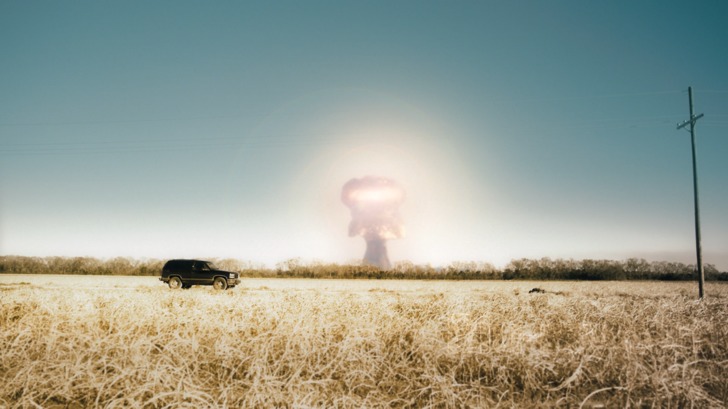
Shot on Red by cinematographer Scott Winig (The Monkey's Paw), Aftermath has been color-corrected to be dark, grimy and monochromatic. Image Entertainment/RLJ's 1080p, AVC- encoded Blu-ray, which was presumably sourced from digital files, provides the usual high-quality image we expect from movies originated on Red, with sharp focus, solid black levels and detailed imagery to the extent that the darkened image in much of the film allows it to be discerned. The shadow detail is quite good, but much of Aftermath is about the loss of individual identity under the democratizing layer of dirt and muck that covers the world when all remnants of social order are blasted apart. Except for the early scenes and an occasional bright object, the color palette is unrelentingly desaturated; even the red of blood no longer looks entirely red, which is both symbolic of the gradual loss of humanity and a literal indication of the survivors' fading health. Video noise and artifacts were wholly absent. With no extras on the BD-25, the 92-minute film achieves an average bitrate of 25.99 Mbps, which is certainly adequate for a digitally originated film and ensures an accurate and error-free image.
Aftermath Blu-ray Movie, Audio Quality 
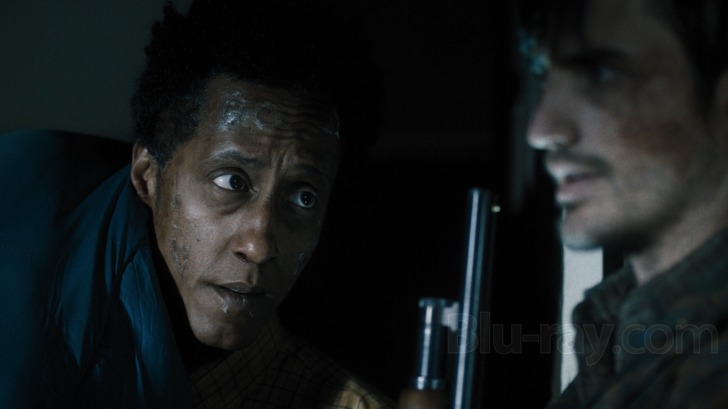
The 5.1 soundtrack for Aftermath, presented on Blu-ray in lossless DTS-HD MA, gives a deep bass wallop to the nuclear attack near the beginning and puts the viewer into the shock waves that nearly sweep Hunter, Jennifer and Satchel off the highway immediately afterward. Inside the shelter, it's more the lack of variation in the ambient noise that is unnerving. When the generally hushed atmosphere is broken by a loud argument or the sound of outsiders trying to break in, the soundtrack's wide dynamic range makes an impact. An all-out war with an especially brutal gang of marauders in the film's third act is especially intense, both sonically and otherwise. Dialogue is generally clear, which is no small trick, because much of it is spoken by people who are whispering, injured or in shock. The score by Austin Wintory (The War Around Us) is appropriately dark and mournful.
Aftermath Blu-ray Movie, Special Features and Extras 
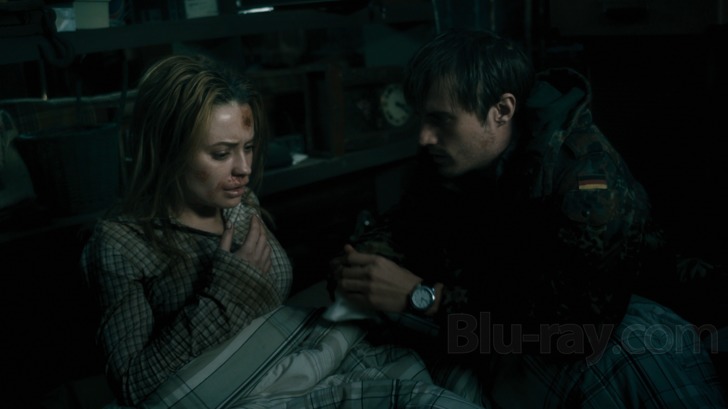
Aftermath has no extras. At startup the disc plays trailers for The Colony, Cabin Fever: Patient Zero, All Cheerleaders Die and Wolf Creek 2, which can be skipped with the chapter forward button and are not otherwise available once the disc loads.
Aftermath Blu-ray Movie, Overall Score and Recommendation 
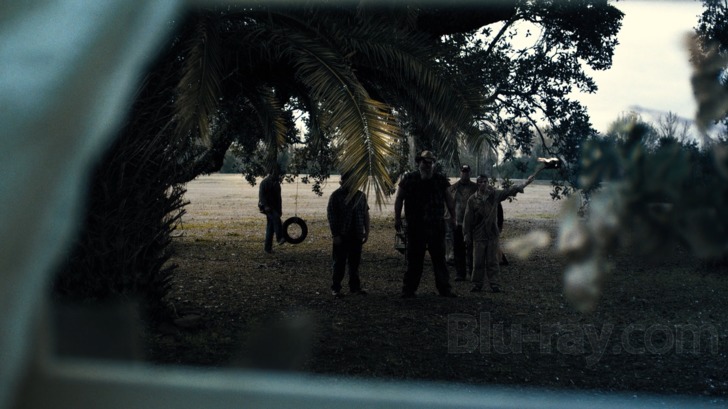
Many theories have been offered on the fascination and continued popularity of the zombie genre. One of its creators and greatest practitioners, George Romero, turned it into a comment on mindless consumer society in Dawn of the Dead. A witty moment in Aftermath occurs when one of the survivors in the shelter is bitten by a badly burned radiation victim who manages to slip in undetected. As the bitten survivor hops around screaming that he's going to turn into one of "them", a fellow shelter occupant contemptuously reminds him that they aren't being attacked by movie zombies, just desperate people like themselves, who are weak, hungry and injured. Still, the confusion is understandable. The way in which others who survived nuclear armageddon are drawn to this place of relative warmth and light, their mindless quest for food, their reduction to primitive instinct, their unwillingness (or inability) to deal with other humans except as objects of prey—these are all classic zombie traits. Perhaps the true fascination of zombie tales is the fact that the zombies were once just like us; it would take only the press of a few buttons to turn people like us into something else. Aftermath isn't what I'd call fun, but it's a revealing experience.
Similar titles
Similar titles you might also like

Maggie
2015

The Sonata
2018

Perversion Story
Una sull'altra / One on Top of the Other
1969

The Stranger
Eli Roth Presents The Stranger
2014

Dream No Evil
1970

The Psychic
Special Edition | Sette note in nero | 4K Restoration
1977

Isle of the Dead
Warner Archive Collection
1945

REC
[•REC]
2007

The New York Ripper 4K
Lo squartatore di New York
1982

Strip Nude for Your Killer
Nude per l'assassino
1975

Grave Robbers
Ladrones de Tumbas | Standard Edition
1989

Autopsy
Macchie solari / The Victim
1975

Don't Torture a Duckling 4K
Non si sevizia un paperino | Limited Edition
1972

A Lizard in a Woman's Skin
Una lucertola con la pelle di donna
1971

Roman
2006

Death Smiles on a Murderer
La morte ha sorriso all'assassino
1973

Deathdream 4K
Dead of Night
1974

The Seventh Victim 4K
1943

Day of the Dead
Collector's Edition
1985

Diary of the Dead
2007